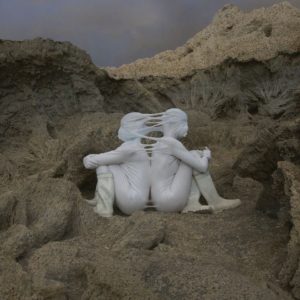 There are many layers of meaning to the virus crisis, from the political to the esoteric, and we’ll be looking at some of them in upcoming blogs.
There are many layers of meaning to the virus crisis, from the political to the esoteric, and we’ll be looking at some of them in upcoming blogs.
Approaching the pandemic from a plurality of angles is our best bet right now. It’s a bad idea to cleave to a preferred ideology, or to glom onto the expert opinion of the week. Things are moving too fast.
The more flexible our mind is, the less likely it is that harmful energies will take it over.
Such as the virus of fear, that great enemy of intelligence.
Scary
Consider the word scary. It’s a word that expresses the helplessness of childhood. Now having a heyday among adults, scary is a word we might have once used for monsters under the bed.
It represents a pre-Saturn-Return consciousness. If you still use it after your Saturn (adult responsibility) is fully fledged, it’s a cop-out. (1)
I don’t mean that feeling fear is a cop-out, nor that we shouldn’t admit to feeling fear. But to call a situation scary  isn’t really admitting to fear. It’s foisting the energy of fear onto the situation, rather than grappling with the fear where it lives: within the self.
isn’t really admitting to fear. It’s foisting the energy of fear onto the situation, rather than grappling with the fear where it lives: within the self.
The ubiquitous usage of scary by news anchors and other public professionals re-generates fear. The implication is that scariness is inherent in their topic, part of its definition, and its most noteworthy feature.
The word encourages us to disown our own role in the fear. To see ourselves as mere bystanders.
 This implicit logic disempowers us. If we believe that the scariness of an external situation has little to do with us, then we can’t change the way we feel about it.
This implicit logic disempowers us. If we believe that the scariness of an external situation has little to do with us, then we can’t change the way we feel about it.
Mortal dread
Astrologers are linking the pandemic to this year’s conjunction of Saturn and Pluto. This combination is traditionally linked to collective breakdown and mortal dread.
They are both square Eris, the dwarf planet of retributive justice. The image comes to mind of Nature rising up in majestic fury.
It has long been expected that the transits of January would be a historic game-changer (see this webinar).
The Saturn-Pluto conjunction recurs every 34 years, and often manifests in particularly literal ways. It has coincided with the last two world wars (there were Saturn-Pluto conjunctions in 1914 and 1947) and with terrorism (an opposition in 2001).
And with disease. The last conjunction was in 1982, when the plague upon us was AIDS. Now, the plague is a tiny creature invariably depicted – it has its own emoji — as a spiky little ball.
From a psycho-spiritual standpoint, the conjunction is an existential teaching about the nature of fear and mortality. It wants to jar us out of our denial of mortality, the root of all other denials and fears, so that we can be fully alive (see this article).
To approach it this way is to see meaning in the unfolding drama, and to fully accept our participation in it.
Together while alone
Social distancing entered the vernacular just in time for the ingress of Saturn (distancing) into Aquarius (social).  We’re more dependent than ever on our little devices, not just for grocery delivery or to order hand sanitizer, but to keep in touch by remote with people we care about.
We’re more dependent than ever on our little devices, not just for grocery delivery or to order hand sanitizer, but to keep in touch by remote with people we care about.
The next 2½ years will prove and disprove the endurance of many friendships and group affiliations (Aquarius), as we test the limits (Saturn) of remote relating.
Saturn also governs old people, the demographic most vulnerable to the virus and subject to its most draconian quarantines.
For a young person, social distancing may increase the FOMO; but for an isolated resident of a nursing home it might mean emotional devastation.
Saturn matures us, by forcing us to define something. It’s hard work figuring out what these new boundaries need to be.
 Meanwhile, Jupiter and Pluto (see April’s SkyWatch) are cranking up the stakes to a life-and-death extreme. All over the world, people are making excruciatingly difficult cost analyses.
Meanwhile, Jupiter and Pluto (see April’s SkyWatch) are cranking up the stakes to a life-and-death extreme. All over the world, people are making excruciatingly difficult cost analyses.
On a societal level this might mean deciding which patients get the hospital ventilators. On an individual level it might mean weighing the risk of contagion with the emotional benefit of a hug from a grandchild.
Divides deepen
The vulnerability of old people to the virus is exacerbating a generational divide. This was nowhere more obvious than in Florida last week, where old folks were sequestered in lock-down while young folks cavorted on the beach for Spring Break.
But the generation gap is only one of the several gaping divides – racial, financial and political — for which our era is notorious.
Politically, the virus is the latest excuse for absurd assaults on the Democrats by Trump and his minions. Racially, it  has fueled mindless attacks against Asians, thanks to Trump’s dubbing it “the Chinese virus.” (2)
has fueled mindless attacks against Asians, thanks to Trump’s dubbing it “the Chinese virus.” (2)
Financially, the pandemic has deepened the class divide everywhere. It is primarily white-collar employees who can maintain their income during the crisis, by working from home. Not so, the army of service workers who bring them groceries, clean their apartments and walk their dogs.
These low-paid workers, who are far less likely to have any employee benefits at all, may not be able to afford to miss even a couple of days’ work. Sanders is the only major public figure addressing this mammoth social schism.
Then there are the plutocratic travesties: bailouts to the 1% and Beltway insider trading while the virus economy reels.
As for the homeless, their shelters-in-place are the unprotected streets.
The months ahead
A series of Pluto transits rocks the sky in April. Epidemiologists have been calling our attention to May and June, as have astrologers. These months feature hard transits of all the outer planets, stations of Saturn and Jupiter, and the ingress of Mars into Aries: the critical next phase of the January stellium.
 Throughout this period, let us heed the lesson of Neptune in Pisces, ruler of the US stellium chart. It calls upon us to embrace the storm of uncertainty swirling around us.
Throughout this period, let us heed the lesson of Neptune in Pisces, ruler of the US stellium chart. It calls upon us to embrace the storm of uncertainty swirling around us.
Admitting we don’t know what we don’t know is a way of laying incense on the altar of the gods.
Notes
(1) Another of my least favorite words is the adjective “concerning,” meaning troubling. “Concerning” is a euphemism that heads in the opposite direction from “scary:” it tries to sound adult, mild and distanced. “I’ve looked at the test results, and your tumor is somewhat concerning.”
(2) Whereas, as Stephen Colbert reminds us, not only can you not get the virus from Chinese food, if you go to Panda Express you can’t even get Chinese food from Chinese food.

